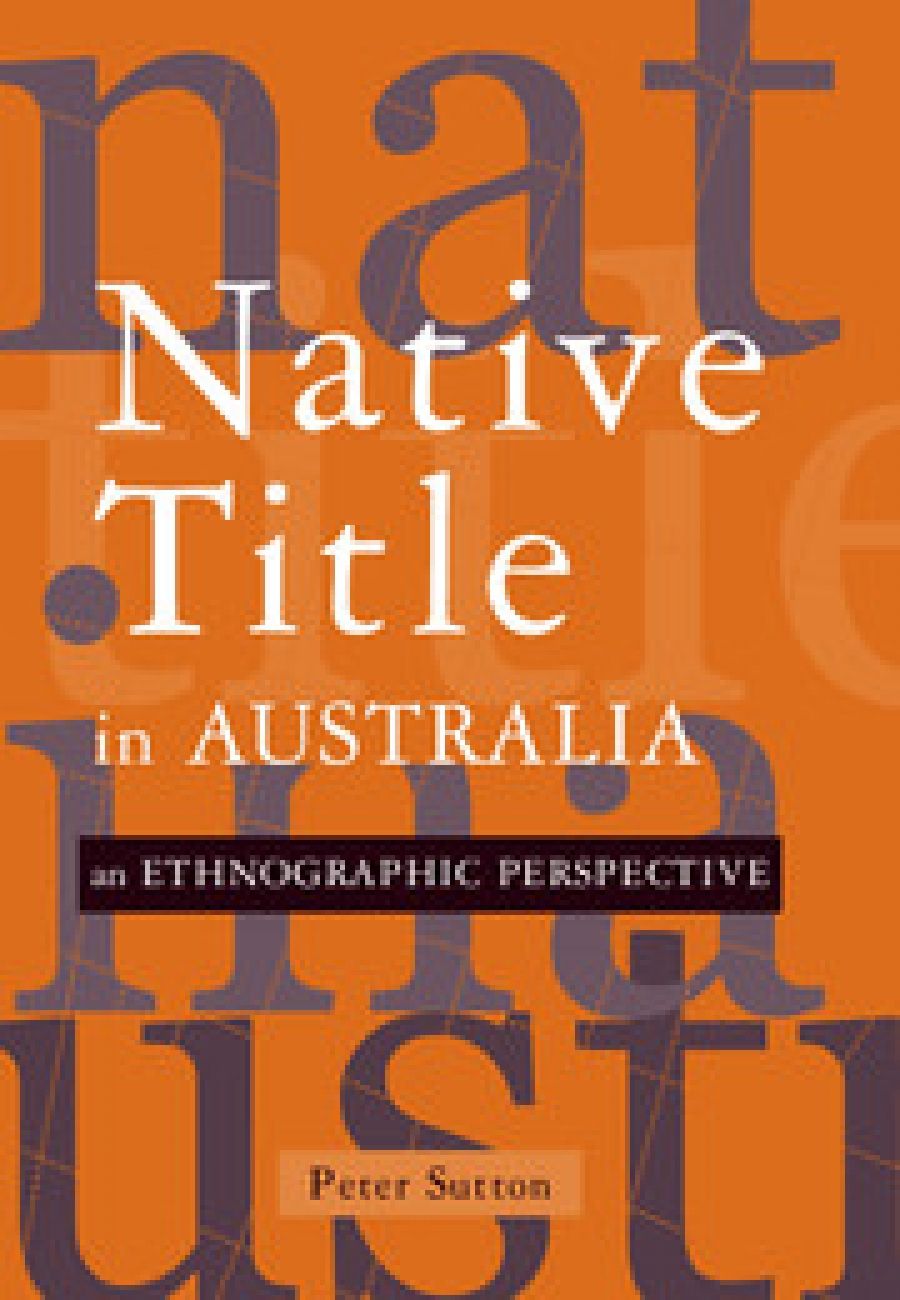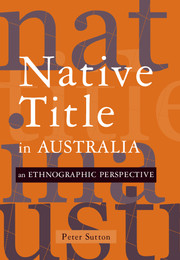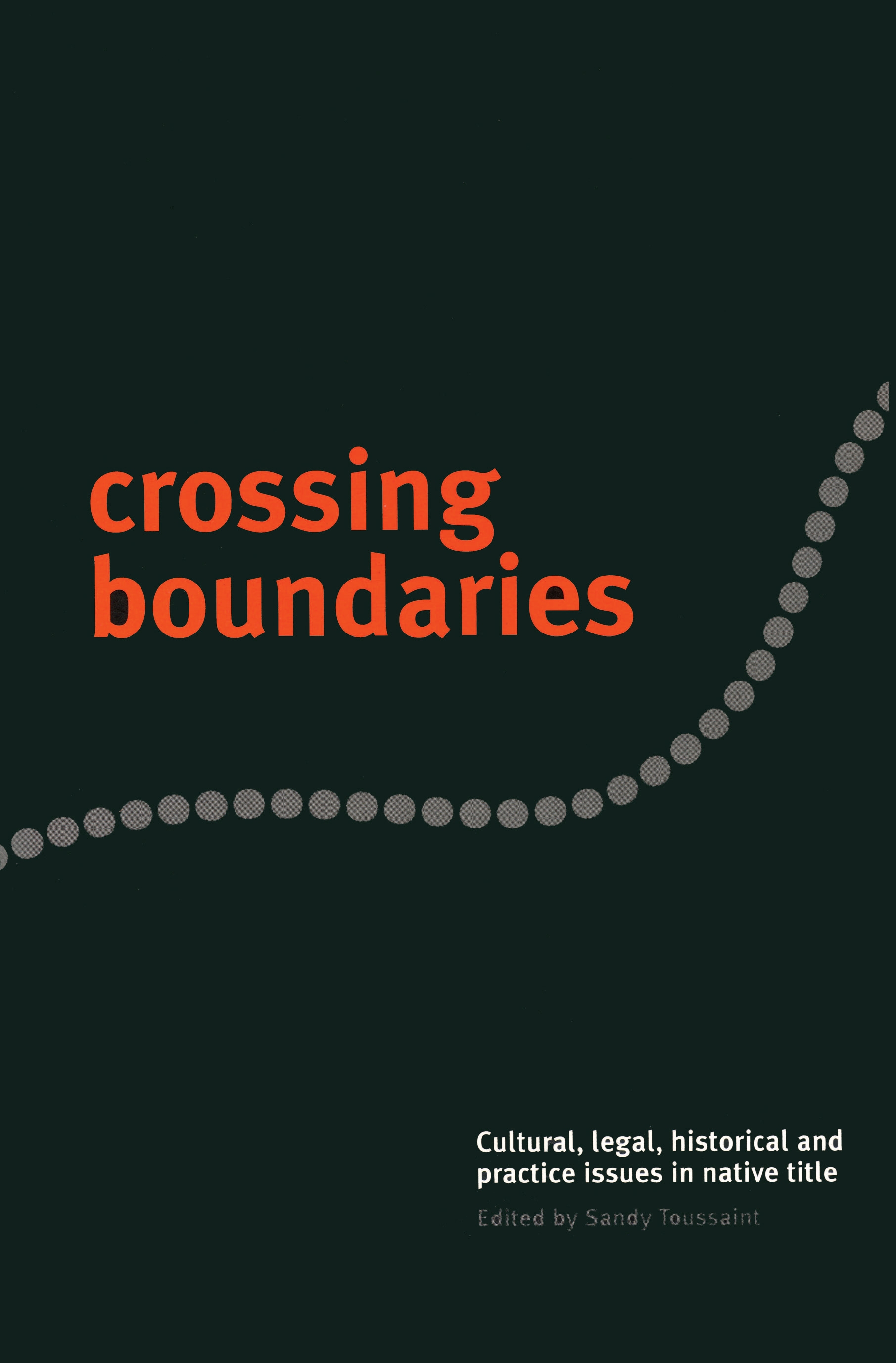
- Free Article: No
- Contents Category: Indigenous Studies
- Review Article: Yes
- Article Title: Spaces of Recognition
- Online Only: No
- Custom Highlight Text:
The cover blurb to Peter Sutton’s book announces that: ‘Native title continues to be one of the most controversial political, legal and indeed moral issues in contemporary Australia.’ The moral issue, qualified by the adverb, is perhaps the one that most strongly engages the general reader, but it is not the central concern of these books that are mainly for the specialist reader. Morality, ‘indeed’, is something that the social scientist must keep at bay, in order to do the work that, as a native title expert, he or she is qualified to do. The expert, usually an anthropologist, provides evidence within the terms of the various native title acts, translating the knowledge of indigenous informants so that it can count in the courts.
- Book 1 Title: Native Title in Australia
- Book 1 Subtitle: An ethnographic perspective
- Book 1 Biblio: CUP, $89.95 hb, 279 pp
- Book 1 Cover Small (400 x 600):

- Book 1 Cover (800 x 1200):

- Book 2 Title: Crossing Boundaries
- Book 2 Subtitle: Cultural, legal, historical and practice issues in Native Title
- Book 2 Biblio: MUP, $39.95 pb, 234 pp
- Book 2 Cover Small (400 x 600):

- Book 2 Cover (800 x 1200):

In this work, we learn a lot about the complexities of native title, and some of the history of how anthropological theories and models have advanced their knowledge. We learn how to distinguish between ‘core’ and ‘contingent’ rights, where the latter are dependent upon or conditional on the stale of relationships with others, for instance by virtue of kinship. We learn about the complexities of social organisation and whether groups are best described in terms of clans, language groups, nations and communities. While Sutton was the instigator of the term ‘classical’ to describe traditionally oriented societies, he does not neglect the organisation of Darwin fringe-dwellers and other ‘post-classical’ indigenous peoples. (One should note that these designations can only be whitefella ones, no Koori or Murri is going to self-identify in this way: ‘Hi, I’m a post-classical Aborigine.’)
Sutton’s book draws on case studies from Queensland, the Northern Territory and the south-east since these are the areas where he has done most of his work, so it is usefully complemented by Sandy Toussaint’ book, which deals mainly with Western Australia.
Crossing Boundaries is a collection of papers from respected and knowledgeable practitioners in native title work, emerging from a conference in Perth in 2000. The papers often draw on solid experience with the aim of extending the terms of debate in ways that are of interest to others in the field. The lawyers, writers, historians, anthropologists and linguists represented here are mostly known within their own professions, and will not be known to the general public (as media commentators for example). It is hard to imagine that the specialist language they use will be understood far and wide.
Perhaps one of the conditions that gave rise to the conference, of which this is the proceedings, was the contentious issue of partisanism, picked up by the media in May 1999, as ‘cultural warriors’ such as Ron Brunton attacked anthropologists, in that now very familiar manner, as ‘politically correct’ because they were considered to be too sympathetic to the political cause of their clients: that is, coming into land-rights assessments already biased in favour of Aborigines. This issue is discussed in the volume by Trigger, Anderson and Tan.
The claim is made that this volume will introduce ‘reflexive contemplation’ and ‘conversation and action across the disciplines’. It is as if this ‘unique cross-disciplinary volume’ (as the first phrase of the introduction self-advertises) invented interdisciplinarity. But most contributors are still writing in the full confidence of the traditional disciplines, and ignore the body of work in interdisciplinary areas such as cultural studies, which, for years now, has already made productive leaps across disciplines. This is understandable, for it is the anthropologists and lawyers, not the cultural studies experts, who have the kind of knowledge recognised by the courts. Still, I might have expected some engagement with the interesting philosophical work of Paul Patton in this field, as he crosses with political theory (see Ivison, Patton and Sanders, Political Theory and the Rights of Indigenous Peoples, 2000; a global and philosophical perspective that would complement both these books). Crossing Boundaries, on the other hand, tends to consist more of the reactions and adaptations of native title practitioners to what has happened to them in the passage from ‘the field’ to the courts. Its unique and valuable contribution is in bringing a strong focus on the relation of history to the law, historical discourses in themselves being less obviously factual and more subject to the interpretative voice of the historian.
The conclusion does not demonstrate how the cross-disciplinary strategy has been effective, or what the gains and losses are. It would have been interesting, too, if more care had been taken to conceptualise the epistemological problem of the legitimacy of indigenous ways of knowing versus legal and social scientific ways. This is clearly a more significant boundary, philosophically speaking, than those among the whitefella disciplines. It is common sense that only the courts can make legal changes, but the ‘spaces of recognition’ of customary law have shifted over the years. This shift needs to be analysed. The conclusion touches on the question of epistemology of indigenous claimants, but it is not enough. If such boundaries are crossed, wouldn’t methodologies have to change or become more hybrid? One field for instance, that docs appear in one article is the more radical critical legal studies, with the project to ‘unmask prevailing legal doctrine and institutions, and to come up with a more substantively just institutional arrangement for law’.
This somewhat naïve idealism brings me back to the question of morality that tends to engage the general reader on questions of native title. The unresolved question of prior occupancy of the nation, and the absence of resolution in a treaty, cause conservative cultural warriors further to bury Aboriginal people under the ‘tide of history’ that had supposedly extinguished the important Yorta Yorta claim. Progressives, however, operating off a springboard of justice and moral rights, seek ways to redress this moral deficit and unfinished narrative in Australia’s colonial history. Their best way to refine and specify that impulse would be to learn more: the books discussed here would be an ideal starting point.


Comments powered by CComment